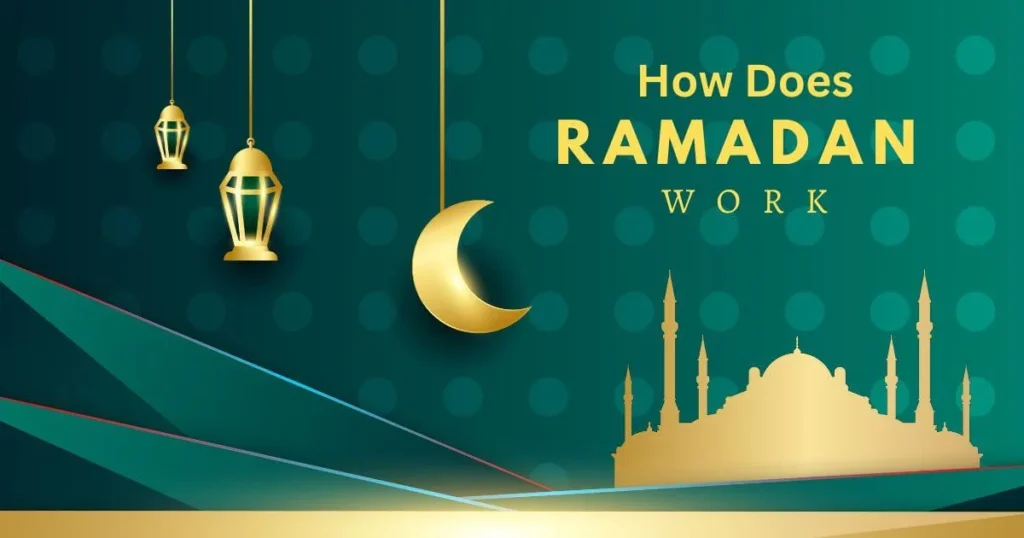
How Does Ramadan Work :
Muslims throughout the world begin a holy month of introspection, camaraderie, and personal development when the crescent moon appears on the horizon, signalling the start of Ramadan. Although many people know that fasting is the main practice of Ramadan, there is more to this holiday than just refraining from food and liquids. It’s an intricate tapestry woven with national customs, religious importance, and individual behaviors.
The Foundation of Fasting
The practice of fasting over the full month of Ramadan, which is observed from sunrise to sunset, is at the center of the holiday. All Muslims who are in good health are required to practice it, with the exception of those who are exempt because of their age, health, or travel history. Muslims refrain from eating, drinking, or smoking at this time, and they also refrain from having sex.
Beyond the Basics
Although the fundamental principle of Ramadan fasting is abstinence, it goes beyond only suffering hunger. It’s a multifaceted approach that supports:
Spiritual Connection:
Muslims strive to develop self-control, humility, and a closer relationship with Allah by forgoing earthly pleasures. It’s a time for heightened introspection on spiritual development, Quran recitation, and prayer.
Empathy and Charity:
Muslims who fast are able to feel the same hunger sensations as those who are less fortunate, which promotes compassion and empathy. This frequently translates into more generous donations to charities and deeds of charity to the less fortunate.
Community and Sharing:
Fasting during Ramadan is more than just a personal habit. Shared meals during the day (Iftar) and before dawn (Suhoor) allow families and communities to come together, mingle, and build relationships.
The Rhythm of a Day
Ramadan fasting establishes a distinct daily schedule:
Suhoor:
Muslims have a pre-dawn meal to prepare their bodies for the day’s fast before sunrise. This lunch is light but filling, providing both protein and complex carbs to keep you feeling energised.
Fajr Prayer:
The Fajr prayer, which initiates the fast, also heralds the start of a day devoted to introspection and spiritual activities.
Daily Life:
People deliberately abstain from food, drink, and other forbidden activities while working and going about their everyday lives. This is the moment to practise more self-control and awareness.
Iftar:
The happy occasion of breaking the fast approaches as the sun sets. Iftar is a time for celebration and blessing-sharing with loved ones, and it is typically shared with family and friends.
Taraweeh Prayers:
Muslims can memorize the entire Quran throughout the month of Ramadan by participating in special night prayers called Taraweeh. These group prayers promote spiritual fulfilment and a sense of unity.
Beyond the Fast
Although the main focus of Ramadan is fasting, there is more to this holy month. Participating in lectures, reciting the Quran, increasing charitable deeds, and fortifying family ties are all essential aspects of the experience.
Conclusion
Knowing how Ramadan works is not just about committing rules to memory. It’s about committing to a life-changing path of discipline, community, and spiritual development. Through an exploration of its meaning, customs, and applications, we can comprehend the actual spirit of this auspicious month and unleash its possibilities for both personal and societal welfare.
FAQS:
All year round, listening to music is prohibited, but during Ramadan it is even more so, making it a greater sin.
The exact start date of Ramadan 2024 may vary somewhat based on location and moon sighting, although it is generally anticipated to commence in the evening of Sunday, March 10, 2024.
The conclusion date is determined by the crescent moon sighting, which marks the beginning of Shawwal, the month that follows Ramadan. It’s predicted to occur on Tuesday, April 9, 2024, with Eid al-Fitr festivities taking place on April 10.
According to the Islamic calendar, Ramadan officially finishes at sundown on the last day of the month, when Eid al-Fitr begins. Until the new moon is sighted—usually declared by local religious authorities—this precise date cannot be established.
Share on >>
